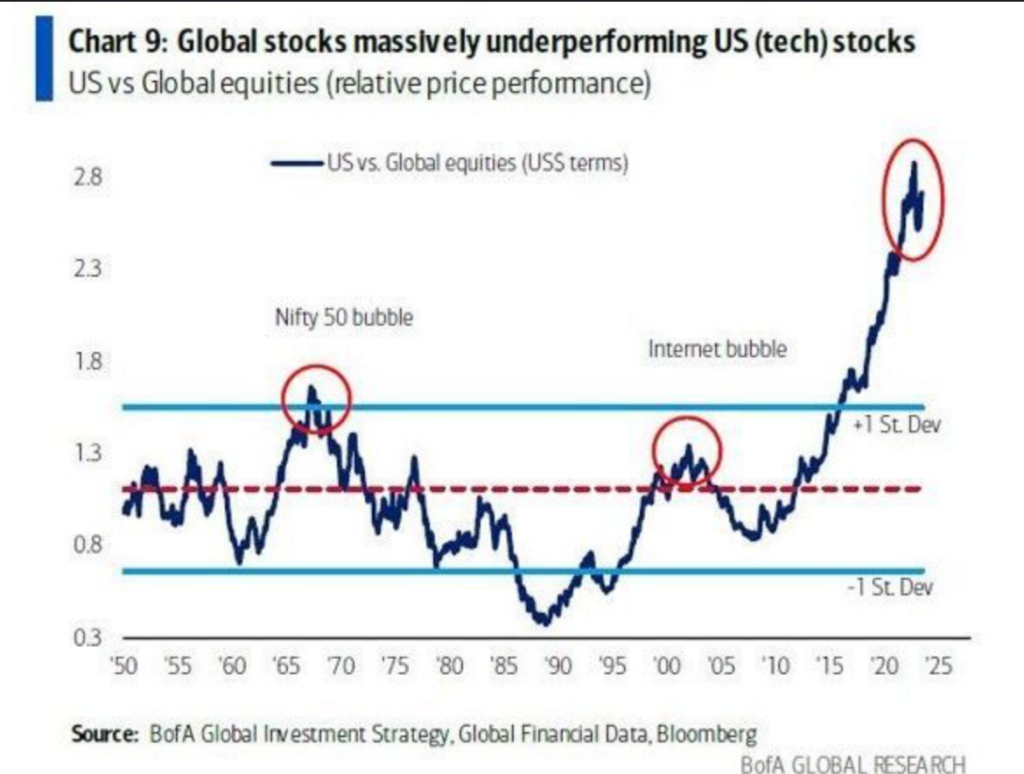1. U.S. Venture Capital Valuations are Down 50%
Torston Slok Apollo As the costs of capital have normalized, venture capital valuations have declined by 50%, see chart below.

2. The Longest Bond Bear Market Ever
Charlie Bilello The Longest Bond Bear Ever. https://bilello.blog
The higher bond yields of today have come after much pain for existing investors.
This is by far the longest bond bear market in history, at 38 months and counting.

And with the current drawdown of over 15%, absent a sharp decline in yields it will take a good while longer for investors to recover from these losses.

The 15% loss in the US bond market over the past three years is unprecedented. But it’s important to remember that what preceded this decline was also unprecedented – that being the lowest bond yields in history
3. Put/Call Ratio Surged Last Week Hitting 5 Year High Levels
Equities: The put-call ratio surged this week, pointing to bearish sentiment.

Source: The Daily Shot https://dailyshotbrief.com
4. This Spread Keeps Getting Larger

5. Defensive Consumer Staple Stocks Leading this Selloff
VDC Vanguard Consumer Staples ETF…50day thru 200day to downside.

6. Bitcoin Less Volatile than U.S. Treasuries in 2023
Bespoke Investment Group Bitcoin Grows Up-When you think about volatility in various asset classes, crypto is typically considered the most volatile, and based on how it has traded over the last seven years, the reputation is well deserved. Since the start of 2017, when bitcoin’s price first crossed above $1,000 through now, bitcoin’s average daily percentage move has been 2.7% (chart below). This year, though, the average daily percentage move has been significantly less at a subdued 1.57%, and just recently, its average daily move over the prior two months dropped below 1%. That’s less volatile than the treasury market! There’s still three months left in the year, but barring some major volatility, bitcoin is on pace for its least volatile year in terms of day-to-day volatility on record. As the years have progressed, bitcoin has clearly become a more seasoned asset class.

https://www.bespokepremium.com/interactive/posts/think-big-blog/bitcoin-grows-up
7. 17 Days Left in Strategic Petroleum Reserve

https://twitter.com/KobeissiLetter
8. BYD Chinese EV Car Company Catching Tesla

9. Average Family Health Premium has Increased from $6k in 2000 to $21,000 in 2022

10. 7 Tips for Improving Athletic Performance-Psychology Today
Learning how to stay in the moment. Ran D. Anbar M.D.
KEY POINTS
- Sometimes, athletes’ worries transform into anger or physical symptoms.
- The best way to excel during a competition is to focus on the play at hand.
- By focusing on the present, athletes are more are more likely to be able to play “in the zone.”
Athletes often report that they have trouble keeping their minds in the game. They may worry about a previous missed play, whether they will make a poor play, whether they will live up to their coaches’ expectations, or whether they will win.
Some worry about injuring themselves, especially if they have previously experienced an injury. In team sports, athletes often worry about letting down their team, team cohesion or conflicts with teammates, and occasionally become upset with the failures of their teammates.
Sometimes, athletes’ worries transform into anger, which they might take out on themselves, their teammates, or even their coaches, relatives, or friends. In other cases, their worries can turn into physical symptoms such as shortness of breath, stomachaches, or headaches. In the latter case, if the athletes are evaluated by a medical practitioner who focuses on addressing their symptoms, rather than the underlying anxiety, patients sometimes are treated needlessly with medications.
The best way to excel during a sports competition is to focus on the play at hand as much as possible. During a competition, thinking about what just happened, or how the play may be affected by factors outside of the athlete’s control, serve as distractions that can lead to a poorer outcome in the game.
For instance, worrying about how the outcome of a single play could affect the entire game adds extra stress that can end up disrupting the play. It should also be emphasized that when team athletes play poorly, including because they become distracted, this can affect the morale and performance of their teammates.
A famous quote by theologist Reinhold Niebuhr is worth keeping in mind while thinking about how to best perform in a competition:
“God grant me the serenity
To accept the things I cannot change,
Courage to change the things I can, and
Wisdom to know the difference.”
During a competition, athletes should focus only on what they can change: their own performance at that time, and, in team sports, being as supportive as possible of their teammates, which can enhance their team performance.
There are several methods that athletes can use to train themselves to focus on the present. By doing so, athletes are more apt to find themselves playing seemingly effortlessly “in the zone.”
Practice Mindfulness. Mindfulness exercises can be used to train the brain to focus on a single thought. For instance, athletes can learn to focus solely on their breath while meditating. When they find their mind wandering from thinking about the breath, they should gently, and non-judgmentally refocus on their breathing. By learning how to better focus their minds during meditation, athletes can similarly learn to focus better on the play at hand.
Calm Breathing. Remaining calm during sports can help athletes stay in the moment. Athletes can calm themselves with their breathing, while resting between plays: They can inhale slowly through the nose, hold their breath momentarily, and then exhale slowly through the mouth. This breathing pattern can be repeated several times to achieve even more calmness.
Be Aware of the Details. Again, while resting between plays, athletes can pay attention to small details, which helps ground them in the moment. For instance, an athlete might pay close attention to what they can see, hear, smell, and touch during a competition. How are any boundaries marked? With chalk, paint, or rocks? What does the equipment (if applicable) look and feel like? What sounds are made during the sport? What odors might be perceived where the sport takes place?
Focus on the Process. Focusing on the mechanics of a play, including the correct actions that need to be taken by the athlete and reactions of the competitors, helps keep the mind in the present.
One Play at a Time. Rather than thinking about competitions as a whole, it can be helpful to focus on accomplishing one play at a time to the best of the athletes’ ability. This approach allows athletes to string together multiple well-executed maneuvers, with minimal distractions.
Embrace Pressure and Mistakes. Athletes can learn to view handling pressure and mistakes as ways to improve rather than as impediments to their performance. Dealing well with mistakes at the moment they occur, including through correcting them efficiently, and moving on to the next play, presents learning opportunities. Athletes also can rise to new levels of achievement by considering the knowledge that is gained from difficult experiences and thereafter implementing new approaches to their athletic endeavors.
Rehearse in Hypnosis. The hypnotic state can be used as an arena in which athletes can practice remaining in the moment during competitions. Athletes can repeatedly imagine participating in their sport while being “in the zone” and thereby train their minds to remain focused during actual competitions.
Takeaway
Athletes should remember that they have the power within themselves to better focus their minds, and thus excel in their sport. It is important to remain patient during this process as mind/body skills improve with repetition in the same way that athletic success improves with physical practice.